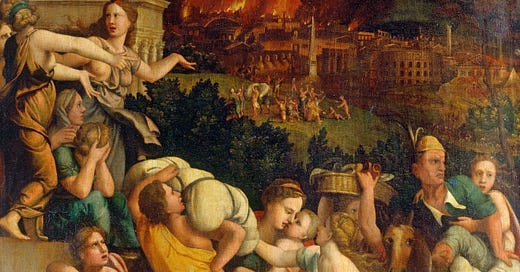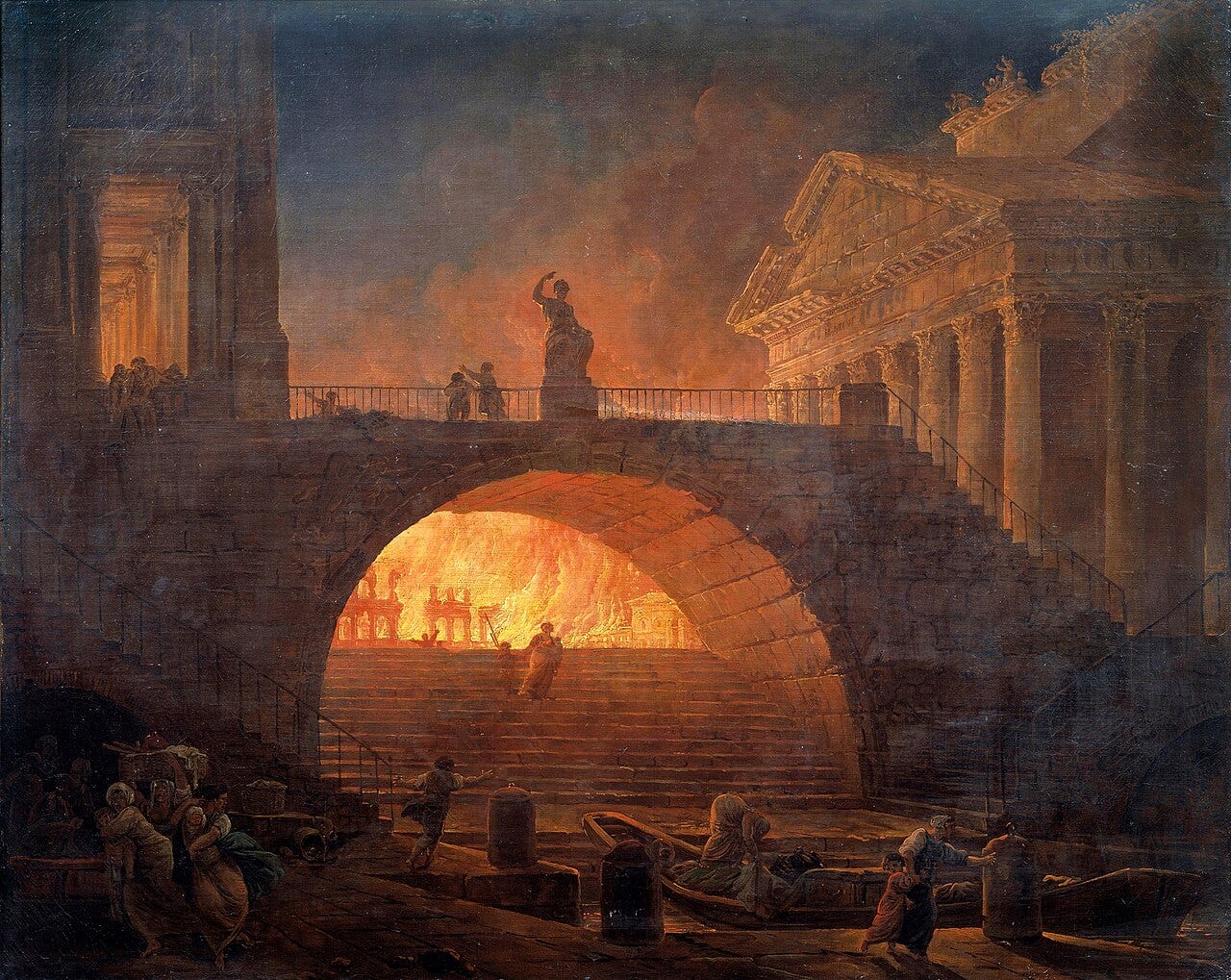’Pretending to be disgusted by the drab old buildings ... [Nero] brazenly set fire to the city ... This terror lasted for six days and seven nights, causing many people to take shelter in monuments and tombs ... Nero watched the conflagration from the Tower of Maecenas, enraptured by what he called ‘the beauty of the flames’; then put on his tragedian’s costume and sang The Sack of Ilium from beginning to end.’
—Suetonius, The Twelve Caesars, VI, 38
They Consult The Sibylline Books
Let us look, oh priests. A line or two may show if fate, this time, or chance, has brought men misery. We shall know, old books. Tell us, that we may know. Misfortune blinds us like the driven snow. The way is shut. The people nor the Senate see. Let us look, oh priests. A line or two may show. Was it we, or someone else, that caused us woe? Jove’s divine justice, or simple human folly? We shall know, old books. Tell us, that we may know. If the tree is in the seed, is the tree’s end also? Is man accursed by his own humanity? Let us look, oh priests. A line or two may show. Or is it chance? Did the fires that rage grow from embers swept in from another country? We shall know, old books. Tell us, that we may know. Caesar plucks his strings and sings like a wicked foe as flames engulf the proud heights of our City. Let us look, oh priests. A line or two may show. We shall know, old books. Tell us, that we may know.
There’s something strange about the story of Rome, such that even its historical facts, regardless of their poetic embellishments, seem as providential and prescient as myth. Whether or not Nero started the fire, and whether or not he actually played an instrument while it burned, as Suetonius and others have suggested, does little to contradict the fateful significance of such an event, given the dire state of Rome at the time.
The City had sold itself to a king, at the cost of its own liberty, for it could at that time, according to Livy, “neither endure [its] vices nor the remedies for them.” And so, though the State prospered under the loan of Augustus, it incurred the debt of his successors, a petty monarchy that deteriorated rapidly, like so many kingdoms of the East Rome had once mocked. The end of the Julio-Claudian dynasty gave way to yet more civil wars, more factions vying for a hollow crown, until the throne itself, thoroughly debased and desecrated, was literally sold to the highest bidder in 193 AD, to Didius Julianus, a wealthy senator, who bought it quite unwittingly.1
It’s true that there was a fire in 64 AD, and that it burned for six days until it was put out, only to reignite again for another three days. Something like 70% of the City went up in flames. Such details are taken for granted, while others, like Nero’s involvement, are painted as propaganda, as smears against the emperor made by writers with agendas.
But good poets tell lies to reveal truths, not disguise them. Such embellishments reinforce and figure more vividly what had already been there for anyone with eyes to see: that fate is merely the description of character, as Jung put it, and the character of Rome was that of a tragic hero undone by the very thing that had made it great.
During the fire, the people of Rome consulted the Sibylline Books,2 as they always did during times of crisis. During the war with Carthage, during the Catiline Conspiracy, during plagues and pestilence. They consulted these sacred books, given to them by the Greek oracle at the dawn of the Republic, when they were desperate for a way forward, for a way out of catastrophe.3 They would interpret the meaning of the Sibyl’s words as best they could, and follow whatever advice they found therein.
Yet by this time the books had been lost for over a hundred years. In their place was a set of reconstructed texts, for the real books had been destroyed by another fire, in 83 BC, which had engulfed the main temple of Jupiter on the Capitoline Hill. The fire had broken out during the civil war of Sulla and Marius, which itself was a precursor to the civil war of Caesar and Pompey that led to the end of the Republic. After Sulla’s victory over Marius, he commissioned the priests of the Sibylline Books to go out and find suitable replacements. Of course, given the circumstances, it’s been speculated that Sulla ‘found’ books favorable to his aims, which were, like Caesar’s, ambitious.
The effect was that, having grown so corrupt, Rome could no longer reliably take its own advice. The well had been poisoned.4
So the people consulted the books for answers they could not possibly glean. They did not realize that they’d sold their souls long ago. The irony of this is so palpable that one almost wants to believe, conspiratorially, that a poet made it up. But the same scenario seems to play itself out again and again in history without the help of poets.
A similar incident in Ancient Greece comes to mind, during the reign of the Thirty Tyrants, after Athens, in its hubris, went to war with Sparta, and lost. The Tyrants took over the city, and Athens lost her democracy. These were the circumstances under which Socrates was put to death. It prompted a blank verse poem that I included in my book The Philosopher, The Poet & The Politician. Here a young Plato realizes that he’s been lied to by the state, for how long he does not know, but vows, like a romantic hero, to undo it by pursuing philosophy.
Plato Quits Politics
I noticed each day on my way to the market the scaffolding on the Royal Porch where Nicomachus the scribe had cut our laws, how each day they plugged up a new one with plaster. I remember thinking to myself with some amusement, Do they really think we’ll forget what was there? That was when the Thirty was making their lists of who to trust and who to get rid of. Theramenes was given hemlock. The people’s silence on that drove me to despair. I wouldn’t go out-of-doors for days, wouldn’t take visitors. It was the hardest kind of knowledge to learn. I remember visiting Socrates one day, distraught and full of blood-dark wine, yelling into his apartment door Do they really want another Pericles? I hadn’t found out the worst of it yet. Nicomachus had been selling the wall this whole time, amending, republishing what was written down, going all the way back to the last oligarch. They do it because they know they can get away with it, because they know, if they don’t change it too much, they can change it all they want. And we let them do it because we think they never actually would. Not long after I swore there was such a thing as evil and that you couldn’t let them name it, you couldn’t leave it up to them because they would change the name, they would make you believe evil was good. And if you were ever born into such a place how would you ever know the difference? I gave up politics for philosophy, terrified of not being able to tell the difference.
Thank you for reading
Some other poems in the series so far:
“Caesar Pater Patriae” - On Caesar the Patriarch
“Brutus the Senator” - A dramatic monologue by Brutus to Cicero
“The Cult of Caesar” - On the divine status of Julius Caesar
“The Ritual Sacrifice of Caesar” - On Caesar’s assassination
“Caesar Ultor” - Caesar takes bloody revenge for his murder
“Caesar Triumphator” - As a god, ruminating on the order he’s created
“Capo the Aquari” - On getting by in the Empire
“The Sibyl Hands Superbus the Books” - The voice of the Sibyl casts a warning
“SPQR” - on the bodies of the State
“Civitas” - On the sentiments of the optimates and the populares
“Vixerunt” - On the fate of the Catiline conspirators
“The Coming of Caesar” - Heroic, galloping dactyls on the omens foreboding Caesar
“Populus” - On Caesar’s political victory over Cato
“Res Publica” - On the decay of the State
“Veni Vidi Vici” - On Caesar’s 10+ years of military ascension
Gibbon’s description of the event is one of the funniest moments in Volume I of the Decline and Fall. Almost as soon as he assumes the throne, Julianus realizes what a bad idea it was, as do the Praetorians who took the bribe from him, and who quickly dispatch him in order to find a more ‘legitimate’ choice.
They did this after Julius Caesar’s assassination, too.
Apparently Augustus realized this during his reign. Suetonius and Cassius Dio say that he tried to ‘purify’ the books, ordering the false ones to be burned. But whether or not he, too, was stacking the deck in his favor, like Sulla, no one can say for certain. The well had already been sufficiently poisoned.






Nice work. The plugging old laws with plaster reminded me of the repainting in Animal Farm—a lot easier to keep them unchiseled. These days they're even un-written: no one will remember the ones and zeros.
I especially like the vilanelle!